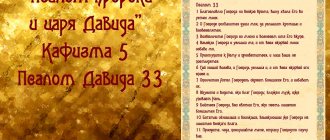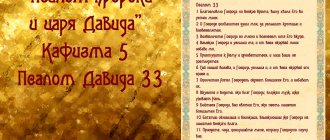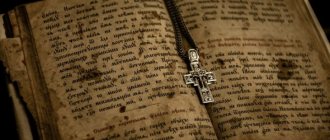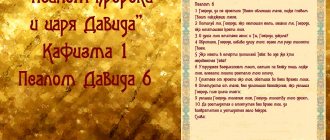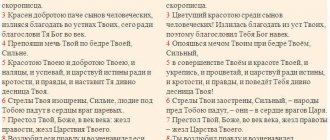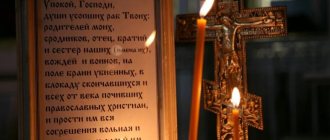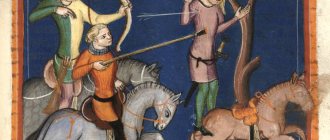The life of the prophet David was never easy. On the way, dangers and trials awaited him. The Mother of God alone was unable to cope with these problems, and David turned to God. The reflection of his life's troubles is revealed to the world by the Psalter.
If many psalms cannot reliably explain to the reader when and where the event took place. Psalm 3 clarifies the circumstances under which this song was written, trusting in the mercy of the Lord.
Attention! We recommend that you read the prayer for money and prosperity by going here.
The History of Psalm 3
The 3rd song was written by David after his flight from Jerusalem. Betrayed by his son and people, he fled in despair, gathering around him only a few people loyal to him. His condition at that time was deplorable. Suffering from illness, having lost everything, a useless king with his last hope turns to the Lord God for help. He asks the Creator to turn away troubles from him, to fairly punish his enemies, and to give him peace of mind. Through this prayer, which begins very pessimistically, the ruler of Ancient Israel gains faith and optimism.
Towards the end, the text becomes filled with joy from the praise of the Creator, His presence in David’s life.
Song 3 was written by David after fleeing Jerusalem.
Detailed interpretation and meaning
Psalm 3 refers to songs of lamentation, telling of disasters, asking for help from the Lord. The interpretation of this prayer is approached by dividing it into several parts.
So, at first David complains to the Almighty, describing to Him all his sorrows. He talks about conspiracy, betrayal, his plight. The author does not understand why they did this to him, because he never wished harm on anyone. However, the king still did not abandon the Creator, continuing to trust in Him and praise Him (“But You, O Lord, are a shield before me, my glory, and You lift up my head”).
The text goes on to say that God answered David’s prayers and gave him a helping hand. The seventh verse is already more optimistic. Confidence, fortitude, and hope for victory are visible in him.
The last two verses are filled with firm confidence that the Almighty will save the king, intercede for him, and punish his enemies.
Interpretation
The story described in the lyrics of the song is recorded in the second book of kings, chapter 12. Psalm 3 is characterized by an emotional presentation that not only tells about the events of the past, but also describes the feelings of King David... the strength of his faith and devotion to God.
The songs of the Psalter are composed of verses, the analysis of which reveals the general interpretation of Psalm 3:
- Verses 1-3 – King David speaks of his suffering and his enemies. He was betrayed by his close people, the majority took up arms against him, but he did not give up his faith, which not everyone wanted to admit. People forgot about God and therefore stopped believing that David was chosen by the Lord to reign. And yet the king did not lose hope and sought protection only from God.
- Verses 7-8 - The author acknowledges and praises the power of the Lord. David places his hope in God for his salvation because He protects all his people, every believer.
- Verse 6: David's spirit was strengthened, the king gained confidence in the future, which gave him hope. Having trusted in the Lord, David ceased to be afraid of enemies and reprisals; here we understand not only specific people, but also all the obstacles, even the internal struggle that hinders the righteous.
- Verses 4-5. David's requests and prayers were heard, and the Lord constantly protected and defended him. Sorrow and pain were powerless, but God was a helper, and faith was a source of strength even in difficult times.
The interpretation of Psalm 3 reveals the main idea of the song: even in pain and despair one must believe and trust in the Lord, since in Him is man’s only salvation.
How and when to read a prayer
The 3rd psalm is part of the first kathisma and is included in the Six Psalms. These prayers are read during evening services. At the same time, the light is completely extinguished, leaving only the lamp. The chanting takes place in the Old Church Slavonic language, the verses are chanted.
If it is not possible to visit the temple, you can pray at home. This should be done in the evening, after sunset.
You need to read the Psalter in twilight, lighting a candle or lamp.
Not everyone is comfortable pronouncing Church Slavonic words, and therefore it is permissible to use a prayer book in Russian.
Psalm 3 is part of the first kathisma
Evening service
Poems are chanted
Text of Psalm 3 in Russian
The modern translation allows us to better understand the meaning of not only the 3rd Psalm, but also the entire Psalter as a whole. It doesn’t matter what language the prayer is said in, as long as it comes from the heart and is directed straight to God.
1 Lord, why have those who oppressed me multiplied?
2 Many rise up against me, many say to my soul, There is no salvation for him in his God.
3 But You, O Lord, are my protector, my glory, and You lift up my head.
4 With my voice I cried to the Lord, and He heard me from His holy mountain.
5 I fell asleep and slept; woke up, for the Lord will protect me.
6 I will not be afraid of the multitude of people who attack me all around.
7 Arise, O Lord, save me, my God, for Thou hast slain all those who were hostile against me in vain, Thou hast broken the teeth of sinners.
8 Salvation comes from the Lord, and your blessing comes to your people.
Do not forget that the Almighty watches all His children day and night. He sees everything, and therefore extends a helping hand only to those who sincerely believe in His power.
If you find an error, please select a piece of text and press Ctrl+Enter.
David and Absalom [Psalm 3]
Psalm 3 begins with the inscription: “ A psalm to David, who sometimes fled from the face of Absalom his son ” (Ps. 3:1). Why, in fact, did King David flee from his son? Because Absalom rebelled against his father, and David was threatened with death. In general, in the book of Psalms there are several psalms that were composed by David during this rebellion, or a little later, when David remembered him. Since many modern people do not know biblical history at all, I think it makes sense to talk about why the relationship between David and Absalom developed the way it did. It is worth saying that the king and prophet David really wanted to be a friend to the Lord. Despite the fact that a huge part of his life was spent on military campaigns, David is one of the brightest personalities of the Old Testament period. However, history knows only One completely sinless man, and this Man was and remains the Incarnate God Jesus Christ. There are no other sinless people, and none are expected. David was not sinless either.
The tragedy of his family began with his sin and his crime. King David fell in love with Bathsheba, a married woman, and entered into a relationship with her. When his mistress became pregnant, David killed her husband, Uriah the Hittite. Anyone can read this story in detail in chapter 11 of the Second Book of Samuel.
The wrath of the Lord was not long in coming. Through the prophet Nathan, David was told that he would be punished.
First, the baby Bathsheba bore to David will die. And so it happened.
People at all times have been acutely worried about the death of children, and I assume that you, the reader, will ask me - what is the child’s fault? Not with anything. Why then did the Lord punish the child?
Here it should be understood that the child died for David and Bathsheba, but with the Lord everyone is alive (Matthew 22: 23-33). The baby's fate in eternity will not depend on the sins of his parents.
But if the baby had stayed in our world, bad things could have happened. The Lord, of course, knew that Bathsheba would remain David's most beloved woman. It was Bathsheba's son Solomon who ruled the people of Israel after the death of David. But Solomon was the second son of David and Bathsheba, already born in a normal marriage. And if their first son had remained alive, then it is possible that he would have ruled Israel after the death of David. And what would happen? That the king of the Old Testament people-church would be the fruit of adultery, because of which Uriah was killed? Perhaps it was precisely because of this that the Lord did not allow this baby to grow up.
But David's punishments did not end with the death of his son.
Nathan said that the Lord will raise up evil against David from his house, and the sword will not depart from the house of David forever (2 Sam. 12: 10-11). This punishment did not come immediately, but over time.
Those were Old Testament times, and the Lord allowed people to have polygamy. He did not order to have several wives, but he also did not punish if someone took several wives.
David also had many wives. Many wives, and many children from the same father, but different mothers. It was between David’s children from different wives that the first act of the tragedy played out, which anyone who reads chapter 13 of the Second Book of Samuel can become familiar with.
Amnon, the son of David by Achinoma, was inflamed with passion for his own sister, Tamar, the daughter of David by Maacah. By cunning he lured him into his house and raped him.
Sin divides people, not unites them. After Amnon's passion was satisfied, it was replaced by another passion, hatred. Amnon hated Tamar and drove her away. After this, the dishonored girl lived in the house of Absalom, her full brother, the son of David from the same Maacah.
It should be noted that according to the law of Moses, the death penalty was imposed for rape (Deut. 22: 25-27).
Did David know about this story? Knew. He found out and got angry. I got angry - and what did I do? Never mind. I got angry and that's it.
We modern people live in times of rebellion. In any country, revolutionaries accuse those in power of all mortal sins, and declare that if power passes into their hands, they will arrange everything as it should. This “as it should” means different things, but it is often stated that we will make sure that everyone is equal before the law. Even if you are the son of the president, or the nephew of the minister, if you have committed a crime, please answer as a simple janitor would answer.
Some people believe such promises. And to me, dear reader, it’s both sad and funny. There has never been and never will be a society without “majors”, without the illegitimate sons of important people. That is, you can strive for this. But this cannot be achieved. We live in a cursed world (Gen. 3:17), in a world distorted by our sins - what’s surprising? If King David, who loved the Lord very much and really wanted to be the Lord’s friend, did not find the strength in himself to execute his own son, then what can we say about our local kings, who neither fear God nor are ashamed of people?
So, Amnon could believe that the dirty story with Tamar would not backfire on him - after all, his father did not pursue him. The father did not, but Absalom harbored a grudge for his sister. He did not threaten Amnon and did not show his hatred in any way, but two years later he killed him. And he fled to the neighboring country, to Talmai, king of Geshur.
What about David? According to the same law of Moses, in the kingdom of Israel you cannot kill people left and right - Absalom would have to answer for lynching! But he didn’t answer. And here David shows gentleness towards his child. After three years, Absalom was allowed to return home.
But the tragedy did not end there, there was simply a short intermission, and soon passions were to boil again. Everything that happened, of course, did not strengthen Absalom’s respect for his father, and, after living in Jerusalem for two more years, Absalom rebelled.
Modern man is accustomed to respect rebels and avengers. It is not uncommon for them to be placed higher than those against whom they rebelled. But it must be said that Absalom was far from his great father.
This can be clearly seen in the examples. Ancient Israel was not just a people, it was the chosen people of God, from whom the Savior, Christ, was to be born. This people were under the special care of the Lord. And the good ruler was not the one who showed himself to be a great warrior or administrator, but the one who carried out the decrees of God.
Among these decrees is this: “Do not touch my anointed ones (Ps. 104:15).”
David fulfilled this commandment carefully, even to his own detriment. The first king of Israel, Saul, hated him for many years. Hated, persecuted, tried to kill many times. And David had the opportunity several times to kill Saul and thus protect himself. But David did not do this (see 1 Samuel 24:10-18; 1 Samuel 26:7-17).
I repeat - David tries his best to do the will of God, and that is why he does not kill Saul. Saul is God’s anointed, how can you touch him?! Yes, Saul is an enemy of David, moreover, he is a bad king who violated the will of God more than once, but still the anointed one!
As a result, King Saul died at the hands of another man - David did not dare to harm the anointed one.
There is nothing like this in Absalom's behavior. His father is God's anointed - so what? Off with his head, whether he is anointed or not - after all, Absalom wants to rule!
And family relationships mean much more to David than to Absalom.
The Law of Moses prescribed that anyone who curses his father and mother should be stoned (Exodus 21:17). Absalom goes further - he intends to kill his father (2 Sam. 17:2-4). David looks at the situation differently; he has not yet forgotten that the rebel is his own son. Before the battle begins, he asks his soldiers not to kill Absalom (2 Sam. 18:5).
Of course, if Absalom had won, he would have been much less careful about observing the decrees of God than his father. But the victory was for the army of David. David's henchmen did not fulfill the main request of their king - the military leader Joab killed Absalom. What David wept about bitterly was that he did not stop loving his son, even after his son stopped loving him (2 Sam. 18:33).
Thus the prophecy announced by the Holy Spirit through the prophet Nathan was fulfilled - the sword did not depart from the house of David (2 Sam. 12:10-11). By the way, this was not the last blood shed in this family. After David's death, his son, King Solomon, killed his brother Adonijah, since he laid claim to his throne (1 Kings 2:20-25).
In short, David paid in full for killing Uriah the Hittite and destroying his family.
It just seems that the “powers of this world” can treat “little people” as they please, commit any atrocities, and nothing will happen to them for it. The example of David proves that this is only an illusion. Whatever a man sows, that he will also reap (Galatians 6:7), and those who sow evil will eventually eat its bitter fruits. It is no coincidence that the Apostle Paul reminded powerful and noble people to treat the “little people” as brothers, giving them due and fair treatment. Not people, but the Lord will ask them how they treated their neighbors (Col. 4:1).
Now let's talk about the psalm itself. It can be viewed from a historical perspective as David's cry to the Lord.
“Lord, why have you multiplied the cold? Many rise up against me, many say to my soul: there is no salvation for him in his God” (Ps. 3:2-3).
Absalom's rebellion was supported by many. We humans often try to interpret what God is doing in a straightforward way. This is how the Jews of those distant times thought that since there was a rebellion, God was angry with David for his sin and turned away from him as he had previously turned away from Saul. This means that God will not save David.
“But you, Lord, are my Protector, my glory, and lift up my head. With my voice I cried to the Lord, and His saints heard me from the mountain” (Ps. 3:4-5).
But David does not cease to hope in the Lord. This constantly fighting man, whose life faced so many dangers that would be enough for ten, learned in life a very important thing - to hope in the Lord.
I don’t remember who exactly, but it seems that one of the Catholic theologians flashed a very beautiful formula: “Work as if everything depends only on you and pray as if everything depends only on God.”
David could do that. In his battles, he fought with all his might, but he did not rely on these strengths. The prophet knew that if the Lord did not become his helper, then all his efforts would be in vain. Centuries will pass, and another prophet, Jeremiah, will say: “Cursed is the man who trusts in man” (Jer. 17:5). Including yourself.
That's it, dear reader. Since childhood, you and I have heard phrases like: “Everything depends only on us”, “Every person is the architect of his own happiness”, “No one will give us deliverance, not God, not the king and not the hero, we will achieve liberation with our own hand.” Holy Scripture teaches us not to rely too much on “our own hand.” The Lord does not condone lazy people, and if a person does not work, then nothing good will come of him. But in any business, in any work, from us there is only effort. Success or failure is from the Lord.
But let's return to David. David knows that he is being punished by the Lord, and is being punished for his deed. But David's unfaithfulness does not mean God's unfaithfulness! David is punished, but not abandoned - the Lord hears the prayers of the king and the prophet.
Those who thought that the same thing would happen to David who sinned as it did to Saul who sinned were wrong. David was not like Saul.
Having become king, Saul became proud, became arrogant and truly abandoned the Lord. Until his death, this man never repented. The word “repentance” is literally translated from Greek as “change of mind.” That is, to repent is to try to change. Saul did not do this and died, remaining a arrogant and stubborn man.
The fall of David is a temporary fall. He could not resist his passion for Bathsheba, but it was still a temporary weakness of a man who really wanted to be faithful to the Lord, but this did not always work out. I think that David could well subscribe to the words spoken by the Apostle Paul. “The desire for good is in me, but I don’t find it to do it. I do not do the good that I want, but I do the evil that I do not want (Rom. 7:18-19).”
And so David’s fall is weakness, not perseverance. And after this fall there was repentance. There is a proverb: “the sword does not cut off a repentant head.” The Lord punished David, but did not abandon him. On David the words of Christ came true: “Him that comes to Me I will in no wise cast out (John 6:37).” David called, and His Friend, the Lord, heard.
“I fell asleep and fell asleep, and arose, for the Lord would intercede for me. I will not be afraid of the people around who attack me” (Ps. 3:6-7).
David trusts in the Lord so much that he can sleep peacefully, despite the fact that he is in great danger. Sleep is a time of complete human helplessness. The sleeper is unable to protect himself not only from a sneaking killer, but also from a mosquito. And David can sleep peacefully, because he knows that the Lord remains his Friend and the Lord protects him.
“Rise up, Lord, save me, my God, for you have struck down all those who were at enmity with me in vain: you have crushed the teeth of sinners. Salvation is the Lord’s, and Your blessing is upon Your people” (Ps. 3:8-9).
David prays to the Lord to save him and grant him final victory over the rebels. “Teeth of sinners” are mentioned here for a reason - if a predator’s teeth are knocked out, it becomes harmless. Let me remind you that David wanted to make Absalom harmless, and not to kill him!
And David ends the psalm with hope in God again, because no matter what a person does, without the Lord’s blessing there will be no use. “Unless the Lord builds the house, those who build it labor in vain; If the Lord does not guard the city, the watchman watches in vain (Ps. 126:1).”
This is how this psalm can be viewed from a historical perspective. But it seems to me that the reader will be interested to know how these words of David can be attributed to the state of his own soul, especially since any parishioner often hears this psalm in Orthodox Churches - it is with this psalm that the Six Psalms begins.
An interesting interpretation was proposed by Saint Gregory of Nyssa in his work “On the Inscription of Psalms,” and everything that will be said below is based precisely on this interpretation.
“And I saw a new heaven and a new earth, for the first heaven and the first earth had passed away, and the sea was no more. And I, John, saw the holy city Jerusalem, new, coming down from God out of heaven... And I heard a loud voice from heaven, saying: Behold, the tabernacle of God is with men, and He will dwell with them; they will be His people, and God Himself will be their God. And God will wipe away every tear from their eyes, and there will be no more death; There will be no more mourning, nor crying, nor pain, for the former things have passed away” (Rev. 21:1-4).
Beautiful - isn't it, reader? By the way, not only this is said about this paradise of the future century, about the Heavenly City of Jerusalem. It is said about the inhabitants of this City that they “will reign forever and ever” (Rev. 22:5).
That is, a person who gains faith in Christ is, as it were, anointed for the future kingdom, preparing to reign with Christ in eternity. And then enemies attack him. Which? People? Or demons?
Saint Gregory of Nyssa claims that your main enemies are your own creations. Just as the rebel Absalom was the offspring of David, so those who rebel against you will be your own offspring. And who is it? Your passions. Greed and pride, lust for power and vanity, envy and love of money - all this rises up against you, man, and tries to deprive you of your future kingdom!
And here a fight is needed. Otherwise, a person simply cannot live in eternity. It is not God who will not allow him into the Heavenly City of Jerusalem - man himself will not be able to enter it!
Let us remember the history of ancient Israel during the time of Moses. After fleeing Egypt, the descendants of Abraham approached the Promised Land relatively quickly for the first time. And what? And nothing - they could not enter it! And only after forty years of wandering in the desert, when almost everyone born in Egyptian slavery died, the renewed people of Israel were able to become the people of God and were able to populate Palestine.
This happens to us too. When we decide to seriously become Christians, we are not going to heaven! Years of struggle await us. All passions, everything sinful, everything that is not God in us will rise up to fight our decision. The battle will be difficult and long. And only by surviving this battle does a person gain the ability to live with God. Both in our temporary world and in eternity.
By the way, how did David fight Absalom? I ran from him and fought with him. So here, too, you need to flee from rising sinful thoughts and fight them in the name of the Lord.
How to escape? Do you remember the first psalm, reader? “Blessed is the man who has no idea in the counsel of the wicked” Ps. 1:1). Not hanging out with those who can learn bad things, not looking or listening to what can raise sinful dregs from the bottom of the arc - this is one of the ways of prudent escape from the passions that rise up against us.
Well, how to fight passions in the name of the Lord - all Orthodox ascetic literature is devoted to this. Let's say, “The soul-helping teachings of Abba Dorotheus.” If you want, read it, reader! Personally, I really like it. Of all the ascetic literature that I have come across, this book is the simplest, most accessible to understand. The same famous “Ladder” by John Climacus, in my opinion, is more complicated.
Saint Gregory of Nyssa draws attention to the fact that if a person goes into battle with his passions, his creations, then the Lord gives him victory. And if it doesn’t work out, passions only intensify. This is how a person works - he is constantly changing. It can't be the same all the time. He is either better than he was yesterday, or worse. If he struggles with passions and tries to cleanse his soul, then this struggle becomes more and more successful over time - the Lord “breaks the teeth” of these passions. On the contrary, if a person constantly gives in to sinful impulses, then this weakens the soul and completely makes it impossible to resist sin.
Sin has greatly spoiled man. A person himself, through the efforts of his will alone, is not capable of defeating sinful impulses. Only by the grace of God!
But the Lord does not distribute grace to those who have not lifted a finger themselves. Our efforts in the fight against passions are absolutely necessary.
After all, if you haven’t even tried to fight, it means you simply don’t need a victory. Really, reader?
References:
John Chrysostom. Conversation on Psalm 3.
Athanasius the Great. Interpretation of the Psalms.
Gregory of Nyssa. On the inscription of psalms.
